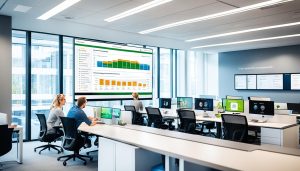The Future of Work: Navigating a Changing Landscape
The world of work is undergoing a profound transformation, driven by various factors ranging from the gig economy and automation to advancements in artificial intelligence (AI) and the evolving concept of work-life balance. In this comprehensive exploration of the future of work, we will delve into these key trends and their implications for the workforce.
Gig Economy and Freelancing Trends
The Rise of the Gig Economy
The gig economy, characterized by short-term and freelance work arrangements, has been on the rise in recent years.
- Flexibility: Gig work offers individuals the flexibility to choose when and where they work, catering to those seeking autonomy and work-life balance.
- Diverse Opportunities: A wide range of gig opportunities exists, from ride-sharing and food delivery to freelance writing and graphic design.
Challenges and Considerations
While the gig economy offers benefits, it also presents challenges.
- Income Stability: Gig workers often lack the stability of a traditional job with a steady income, making financial planning challenging.
- Benefits and Protections: Gig workers may not have access to the same benefits and legal protections as traditional employees, such as healthcare or unemployment benefits.
Automation and Job Disruption
The Impact of Automation
Automation, driven by AI and robotics, is reshaping industries and occupations.
- Efficiency and Productivity: Automation can improve efficiency and productivity in various sectors, from manufacturing to customer service.
- Job Displacement: Some jobs may become obsolete as automation takes over routine tasks, leading to concerns about job displacement.
Adaptation and Job Evolution
To thrive in the age of automation, workers need to adapt and embrace lifelong learning.
- Reskilling: Workers can acquire new skills to stay relevant in the job market, focusing on areas where human creativity and judgment are irreplaceable.
- Job Evolution: Automation can transform job roles, with workers increasingly collaborating with AI and technology to enhance their productivity.
The Role of AI in HR and Recruitment
AI-Powered HR Solutions
AI is revolutionizing human resources and recruitment processes.
- Candidate Screening: AI algorithms can quickly analyze resumes and applications to identify the most qualified candidates.
- Predictive Analytics: HR professionals can use AI-driven predictive analytics to forecast employee turnover and make more informed decisions.
Ethical and Bias Concerns
AI in HR raises ethical concerns regarding fairness and bias.
- Bias Mitigation: Careful design and monitoring of AI systems can help mitigate biases in recruitment and HR practices.
- Transparency: Employers must be transparent about the use of AI in HR and ensure that candidates understand the selection process.
Upskilling and Reskilling for the Future Workplace
Lifelong Learning Imperative
The evolving job landscape requires a commitment to continuous learning.
- Upskilling: Enhancing existing skills to adapt to changing job requirements is essential for career growth.
- Reskilling: Learning entirely new skills can open up opportunities in emerging industries.
Corporate Responsibility
Employers play a crucial role in upskilling and reskilling their workforce.
- Training Programs: Companies can provide training programs and resources to help employees acquire new skills.
- Adaptive Learning: Personalized learning experiences, enabled by AI, can tailor educational content to individual needs.
Work-Life Balance in the Digital Era
Digital Transformation’s Impact
The digital era has blurred the boundaries between work and personal life.
- Remote Work: The ability to work from anywhere has increased the importance of setting clear boundaries to maintain work-life balance.
- Burnout Risk: Constant connectivity and the pressure to be always available can lead to burnout and decreased well-being.
Strategies for Work-Life Balance
Maintaining a healthy work-life balance is essential for overall well-being.
- Time Management: Effective time management techniques, such as setting boundaries for work hours, can help strike a balance.
- Mental Health Support: Employers should prioritize mental health and provide resources for employees to manage stress and maintain a healthy work-life balance.
Conclusion
The future of work is a dynamic landscape, characterized by the gig economy, automation-driven changes, the integration of AI in HR and recruitment, the imperative of upskilling and reskilling, and the evolving concept of work-life balance. While these trends offer opportunities for greater flexibility, efficiency, and personal growth, they also present challenges that must be addressed collectively by individuals, organizations, and policymakers.
Embracing the future of work requires adaptability, a commitment to lifelong learning, and a focus on ethical and equitable practices. As technology continues to advance, and the workforce evolves, we must work together to shape a future of work that empowers individuals, fosters innovation, and ensures a healthy work-life balance for all. By understanding and navigating these trends, we can build a more inclusive, resilient, and sustainable workforce for generations to come.


